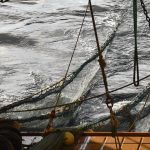There are loopholes and gaps in the high seas fisheries management, says two independent studies. The studies also revealed that ineffective international management is undermining the future of high seas fisheries, fish populations and the health of marine ecosystems. According to one study governments have been ineffective in stopping illegal fishing. The Pew Environment Group, which prepared this first-ever comprehensive report on the topic, reached that conclusion by evaluating government actions regarding documented vessels, known to fish illegally, that enter ports with fish from the high seas.
The second study evaluates 18 regional fisheries management organizations (RFMOs), the intergovernmental bodies tasked with managing fishing on the high seas. The study showed that the RFMOs have failed to halt dramatic declines of fish stocks. The Pew study focused on the role that Port States can play in combating illegal, unreported and unregulated (IUU) fishing.
The study assessed how well Port States complied with measures adopted by eight RFMOs and directed against vessels found to carry out or support IUU fishing over the last six years. Kristín von Kistowski, a senior advisor to the Pew Environment Group who manages the Port State Performance research project, said that the research shows that the current system leaves significant loopholes for those engaging in IUU fishing to exploit.
The study in Marine Policy, from University of British Columbia researchers Sarika Cullis-Suzuki and Dr. Daniel Pauly, is the first to quantitatively score the performance of 18 RFMOs to determine how well they manage high seas fisheries “on paper” versus “in practice.” Dr. Susan Lieberman, International Policy director for the Pew Environment Group, said that healthy fish populations are critical to the future of our oceans and provide food security for billions of people around the world.








